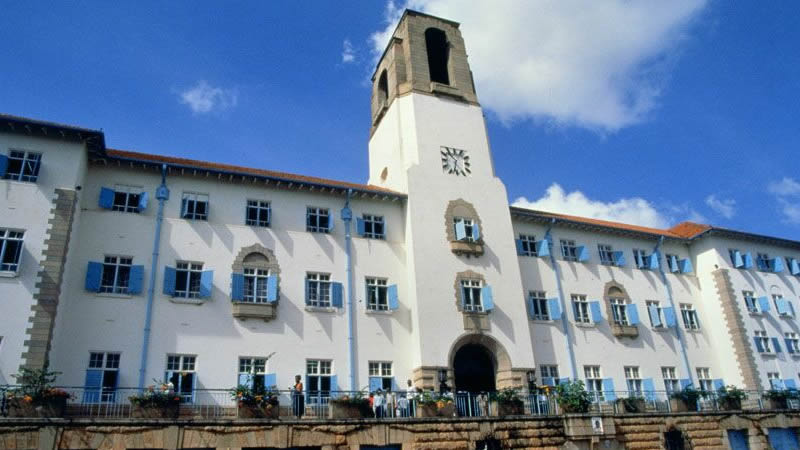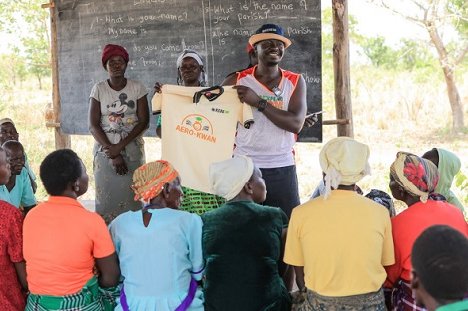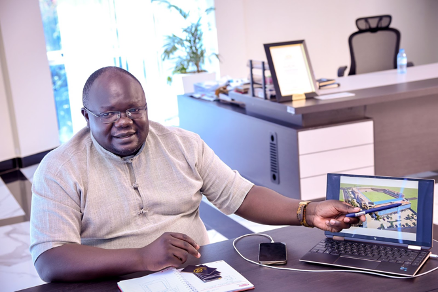By Karane Tuhirirwe
Uganda, famously dubbed the "Pearl of Africa" by Winston Churchill, hosts the largest refugee population in Africa and the sixth largest in the world. According to the United Nations High Commissioner for Refugees (UNHCR), approximately 1.6 million refugees currently reside in Uganda, with nearly 60% from South Sudan and over 30% from the Democratic Republic of the Congo. While these numbers highlight the immense burden on the host country, they barely scratch the surface of the individual stories and struggles faced by these refugees. Fleeing a myriad of wars in their home country, they seek safety and a chance to rebuild their lives in the neighboring country.
Early childhood
One such story is that of Safali Libia, a 2024 Economics graduate from Makerere University. Born in Bunagana, in the eastern part of the Democratic Republic of Congo (DRC), Safali's name is deeply rooted in the circumstances of his birth. Amidst the outbreak of another armed conflict in 1997, Bunagana's residents were fleeing a violent clash between the M23 rebels and the DRC government. It was during this turmoil that Libia was born, and his name, meaning “journey” in Kiswahili, reflects the exodus his community experienced. His second name, Libia, was inspired by the deployment of Libyan peacekeeping forces in the region, who became well-known in Bunagana. This name was commonly given to children born during that period and he shares it with several of his agemates, including a close cousin.
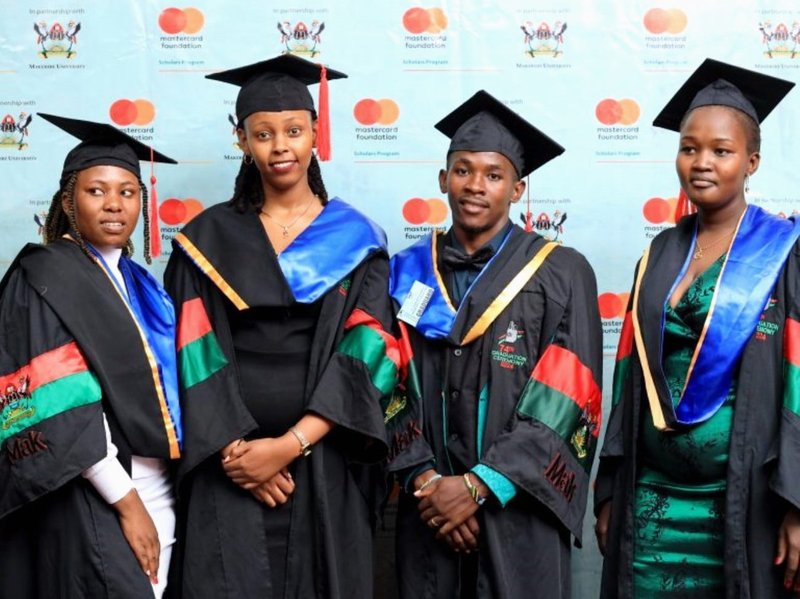
Safali Libia (2nd from right) together with his colleagues on graduation day
In 2012, Libia's father was kidnapped by rebels, who routinely captured able-bodied men to use as forced labour for carrying loot and as scapegoats for their misdeeds. As the conflict worsened, young Libia, along with his mother and siblings, was forced to flee the DRC in 2013. They settled in Kisoro, in southwestern Uganda. After a few months there, they received news that their father was alive and living in the Kyangwali refugee camp, located in what was then Hoima District, now known as Kikuube District. This news allowed the family to reunite and plan their future in a foreign land.
Studying as a refugee
Due to their family home being just 5 kilometres from the Ugandan border and the persistent conflicts in the region, Libia found himself studying the Ugandan curriculum at a school in Kisoro District. Before learning about his father's presence in Kyangwali, he had been taken in by a family in Mpigi, where he attended Bukibira Church of Uganda Primary School and sat for his Primary Leaving Examination (PLE), while his mother and siblings remained in Kisoro.
After completing primary school, Libia did not proceed to secondary school immediately. Instead, he rejoined his mother and siblings in Kisoro. During this time, he took on manual labour, such as tilling land in the community, which ensured he had food to eat each day. This period of hard work lasted for about five months before he could continue his education.
The family then relocated to Kyangwali settlement camp on receiving news that his father was resident in the camp.
“My father had settled in the camp for some time, and he knew so much there. So, I joined a public secondary school for my senior one at Kyangwali Secondary School.
“Because we were still finding it difficult to get all the necessary needs, I used my evenings to join my family in tilling land to get food,” he says. Eventually, this work-academic balance affected his grades, and he recalls that “...the best mark I got was a third grade for the two years I was studying there.”
He was however lucky when he got a scholarship from COBURWAS International Youth Organization to Transform Africa (CIYOTA), to go attend Kitara Secondary School in Hoima. The organisation offered school fees and accommodation whereas the beneficiaries were expected to feed themselves.
“I later completed my O-Level and fortunately, I still qualified to be a beneficiary of this programme. I joined A-level at Albert Secondary School offering HEG/SM (History, Economics, Geography and Sub Math), still in Hoima District and I managed to get 15 points.” He is saddened by the fact that the latter school has since been changed to a nursing school.
University life
As a refugee, Libia asserts that he "did not have any hope of joining a prestigious university like Makerere." During his Senior Six vacation, he took on any job that would bring in a few shillings, including collecting data for the UNHCR and volunteering at a SACCO as an agent banking attendant.
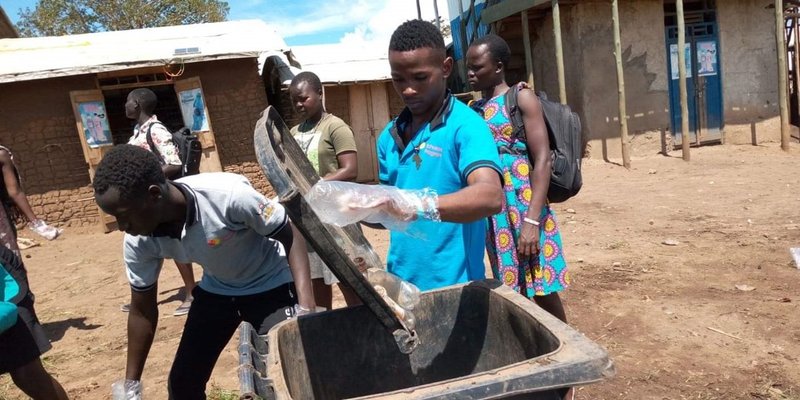
Safali participating in one of the community projects inside Kyangwali Refugee Camp
His fortunes changed when he attended an educational programme at CIYOTA, where young people were trained in skills such as entrepreneurship and essay writing. It was through this training that he learned about the Mastercard Foundation Scholars Program at Makerere University. The catch, however, was that applicants needed to be admitted to the university first.
"I had no application fee, which amounted to UGX 50,000, but a family friend gave me the money. Incidentally, my geography teacher, who was a student at Makerere at the time pursuing a Bachelor's Degree in Economics, helped me apply for admission.
"A few weeks later, I received a phone call inviting me for interviews at the University Senate building while I was at a youth camp at Lake Bunyonyi, Kabale. This was followed by another call a month later, informing me that I had earned the scholarship. I left my volunteering job early that day to share the good news with my family, and it was a joyful moment at home," he shares.
Makerere University offered Libia a position to study for a Bachelor’s of Arts Degree in Economics, and he fondly remembers the early days of his university life.
"Unlike the usual studying environment in high school, campus was different because of the new teaching experience, social classes, and the reading culture. I realised that I needed to quickly learn how to socialise better so that I could cope with the much-needed discussions," he says.
While deeply engaged in his academic endeavours at the Ivory Tower, Libia remained mindful of his family's situation back home, where his parents continued to do manual labour in the Kyangwali refugee camp. Fortunately, his scholarship included a living allowance, "which I partly used to support my younger brother, who was a Senior Four graduate then. I supported his studies at Albert Secondary School in Hoima because I knew he wouldn’t make good grades had he stayed at Kyangwali S.S. I am glad that he has also earned a Mastercard Foundation scholarship to United States International University in Kenya."
Life after university
Libia is now entirely focused on improving the lives of his community through an organisation he co-founded with friends called A Hand for a Refugee.
"I am invested in the economic transformation of my community, and I am confident this kind of empowerment is what changes the world. I believe that I am privileged to have attained this level of education, and I owe it to my community to use my acquired knowledge to better their lives," he shares.
He is dedicated to training camp residents in modern farming methods to boost their incomes. "The majority of our community in the camp depends on agriculture for their livelihood, so we developed a better farming model that focuses on vegetables and fruits, as opposed to maize and beans, which have long gestation periods and attract low prices. Moreover, we have limited arable land," he shares.
However, his efforts have not been without challenges. "One of the biggest problems is the market for the produce. Our training focuses on fruit and vegetable growing due to our land tenure system, but finding a market for these perishable goods is difficult. The organisation is seeking partners interested in fruit processing to ensure a ready market for the produce. This way, the community can act as out growers," Libia explains.
Advice to students from humble backgrounds
To students from humble backgrounds, Libia offers this advice: "The university environment is exciting, especially in the first semester, but prioritise your academics and minimise time spent on social pleasures, despite the pressures. Remember that you're not the first to face such conflicting situations, and with time, everything will align as you progress through campus. Determination and focus, combined with dreaming big, will keep you on track."
Related News
![]() Please join hands with the Makerere University Endowment Fund as it works towards attracting & retaining the best faculty, providing scholarships, and investing in cutting-edge research and technology.
Please join hands with the Makerere University Endowment Fund as it works towards attracting & retaining the best faculty, providing scholarships, and investing in cutting-edge research and technology.
